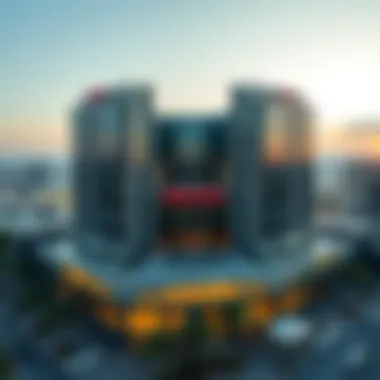Understanding Reem Mall Ownership and Its Impact


Intro
In the heart of Abu Dhabi’s vibrant urban landscape, Reem Mall stands as a monument to the evolving dynamics of Dubai's property market. As the real estate scene continues to morph, understanding the ownership structure of this commercial hub is vital for anyone with a vested interest—be it investors, developers, or even aspiring homeowners. Delving into the intricacies of the Reem Mall ownership not only sheds light on the mall's operational hurdles but also illuminates the larger economic forces at play in Dubai.
The ownership of Reem Mall acts as a microcosm for the challenges and potentials inherent in the Dubai real estate sector. With its strategic significance marked by prime location and state-of-the-art amenities, one can certainly argue it stands as both a case study and a beacon for future aspirations. Investors seeking avenues to navigate Dubai's commercial landscape will find rich insights here, particularly on how ownership structures can influence market dynamics.
Market Insights
Current Trends in Dubai Real Estate
The property market in Dubai isn’t just bustling; it’s booming in various directions. Current trends show a shift towards more immersive and community-oriented developments. Reem Mall is nestled within a larger ecosystem of living spaces, which highlights the trend of blending retail with hospitality and residential offerings. Investors looking at this shift might notice that properties near integrated spaces tend to appreciate faster, attracting not just local but international buyers.
Moreover, the post-pandemic recovery has seen a renewed interest in large retail spaces alongside an uptick in inquiries for mixed-use developments. Here’s what’s striking:
- E-commerce Growth: A rise in online shopping has led malls to rethink their strategies, enhancing customer experiences to draw them back.
- Sustainability: There’s a rising demand for eco-friendly initiatives in construction and maintenance, which has prompted developers to adopt greener practices.
- Resilience and Adaptability: The successful properties are those that can adapt to market shifts, either by repurposing space or enhancing digital offerings.
Investment Hotspots and Opportunities
When pondering investment opportunities, it’s prudent to consider the neighborhoods surrounding Reem Mall. These areas are undergoing rapid transformation, promising both short-term gains and long-term stability.
Here are some hotspots worth the attention:
- Al Reem Island: This area is quickly gaining traction due to its blend of residential, commercial, and recreational spaces. It offers an appealing lifestyle for families as well as professionals.
- Saadiyat Island: Just a stone's throw away, its cultural offerings add value to real estate opportunities, attracting expats and tourists alike.
- Downtown Abu Dhabi: The reach expands favorably here, appealing to those who want to be at the center of it all.
The evolving landscape of these hotspots is compelling for passive income opportunities, particularly in rental yields. Investors are keen to spot these changes early to capitalize on the heightened demand for quality living spaces.
"Understanding the synergy between lifestyle integration and accessibility could be key in capitalizing on Dubai's real estate potential."
Lifestyle Integration
Community Living in Dubai
With the emphasis on community living, the cultural fabric of Dubai is being enriched. Living options nearby like Al Reem Island provide a robust sense of community, which increasingly appeals to expatriates seeking belonging. The allure of integrated living—where shops, schools, and leisure facilities converge—cannot be overstated. Properties that facilitate such arrangements are witnessing heightened demand.
Moreover, families value safety and amenities, bolstering preferences for gated communities with parks and playgrounds. This paradigm encourages developers to rethink their strategies, aiming to foster environments that enhance quality of life.
Amenities and Luxury Features
When considering luxury features, Reem Mall presents an exceptional case. High-end shopping, gourmet dining, and recreational facilities elevate the consumer experience well above the ordinary. The mall boasts:
- Cinema Experiences: State-of-the-art theaters offering immersive screenings.
- Dining Options: A wide spectrum of culinary delights, catering from fast food to gourmet eateries.
- Event Spaces: Designed for community gatherings and enhancing social interactions.
Providing these amenities not only enriches lifestyle but also enhances property desirability, making it a focal point for potential investments. As developers unveil exciting projects, aligning with the preferences of modern consumers will be pivotal.
Ultimately, understanding the Reem Mall owner's landscape offers invaluable insights into Dubai's multi-faceted real estate scene. By grasping these trends and the nuances of ownership dynamics, stakeholders can navigate their paths with greater clarity and purpose.
For further insights: Wikipedia Reem Mall, Dubai Real Estate.
Overview of Reem Mall
The Reem Mall stands as a monumental symbol of modern retail and leisure in the heart of Abu Dhabi, reflecting not just an evolving commercial landscape but also the aspirations of a vibrant community. This mall is not merely a venue for shopping; it is a carefully crafted ecosystem designed to cater to a diverse range of needs. Understanding the Overview of Reem Mall thus becomes crucial for anyone interested in the intricacies of Dubai's property market.
Through its significant footprint, the Reem Mall offers a glimpse into the broader economic context of the region. The mall is strategically positioned on Reem Island, capturing the attention of both residents and tourists alike. This pivotal location enhances its appeal, making it a primary choice for consumers and investors.
Foreword to Reem Mall
Located in a burgeoning residential area, Reem Mall is positioned to offer a distinctive shopping and entertainment experience. The structure itself marries aesthetics with functionality, featuring spacious retail areas, dining options, and entertainment zones. From high-end brands to local boutiques, the versatility caters to varied consumer preferences. This mix is vital in understanding not only how the mall operates but also how it attracts visitors from all walks of life.
By introducing an extensive entertainment sector that includes a major family entertainment center and a snow park, Reem Mall is poising itself as a cornerstone of leisure in Abu Dhabi. This goes beyond the traditional mall experience, indicating a shift towards more dynamic lifestyle offerings. Which in turn has implications for the surrounding property values and rental markets.
Vision and Objectives
The vision behind Reem Mall speaks to a broader narrative of innovation and community-centric planning. Stakeholders aspire for the mall to be more than just a shopping complex; they aim for it to be a cultural hub where people can gather, socialize, and engage in activities conducive to community growth. This ambition forms the foundation of their strategic thinking.
The primary objectives revolve around creating a sustainable environment that blends residential, commercial, and recreational spaces. An emphasis on sustainability not only resonates with current consumer preferences but also aligns with global trends towards eco-friendly development. Keeping this vision at the forefront, the management’s goals include:


- Encouraging community engagement through events and programs.
- Developing partnerships with local businesses to boost economic activity.
- Enhancing the mall's adaptability to future retail trends and consumer demands.
Ownership Structure and Key Players
The ownership structure of Reem Mall is the backbone of its operational effectiveness and market standing. Understanding this intricate web helps both investors and stakeholders navigate the complexities of Dubai’s commercial property landscape. The significance of ownership lies not only in the financial implications but also in how strategic decisions impact the mall’s functionality, customer experience, and long-term sustainability. Also, it sheds light on the personalities driving the vision as well as the operational realities of Reem Mall.
Primary Owners of Reem Mall
Reem Mall has a multifaceted ownership structure that plays a pivotal role in its strategic direction. The prominent player behind the mall is Aldar Properties, a powerhouse in the Emirati real estate sector known for its innovative projects. Their commitment to excellence has set the stage for Reem Mall to become a hub of retail and leisure in Abu Dhabi.
In addition to Aldar Properties, other stakeholders include Tamouh Investments, an influential investment group that focuses on developments on Reem Island. Their partnership expands the capabilities and resources allocated to Reem Mall, which can lead to enhanced visitor experience and diversified retail offerings.
Effectively, the alignment of objectives among these primary owners creates a united front, ensuring that the mall adapts to market trends while maintaining its unique identity. This cohesiveness can be a significant selling point for potential investors, as stability in ownership often translates into reliability in operations and marketing.
Stakeholder Analysis
Diving deeper into stakeholder analysis reveals the various impacts the different players exert on Reem Mall's operations and growth trajectories. Here are some key elements to consider when analyzing stakeholders in this context:
- Influence of Local Authorities: Local government entities play a crucial role since they set the regulations and frameworks guiding property developments. Their insights on community needs can align with Reem Mall’s objectives, ensuring it caters effectively to local demographics.
- Retail Partners: The brands and retailers within Reem Mall are essential stakeholders who directly impact customer attraction. The types of shops featured and their management will echo the mall’s image and draw foot traffic.
- Consumers: While often overlooked, the consumers hold the ultimate power. Their preferences shape what retailers stock and how the mall positions itself in the competitive landscape. Feedback mechanisms, such as surveys or social media engagements, can help ownership understand visitor expectations.
- Community Engagement: Local residents and community groups are vital. Their perception of the mall influences its reputation. Engagement strategies, such as community events or partnerships with local organizations, can foster goodwill and enhance loyalty.
In summary, the willing collaboration of both primary owners and diverse stakeholders is integral to not just the operational success, but also to the sustained growth and desirability of Reem Mall in a competitive environment. Recognizing these dynamics offers prospective investors a clearer picture of the potential risks and rewards in their involvement with this landmark destination.
Economic Impact of Reem Mall Ownership
The economic significance of the Reem Mall's ownership extends its influence far beyond its physical footprint. It presents a multifaceted impact on the local economy of Dubai, contributing not only to immediate fiscal benefits but also fostering long-term growth avenues. Understanding this impact can help investors, developers, and other stakeholders grasp the mall's role as a catalyst for economic activities. This section explores two main facets of the economic implications stemming from the ownership of Reem Mall: its contributions to the local economy and the job opportunities it creates.
Local Economic Contributions
Reem Mall’s construction and subsequent operations breathe new life into the economic landscape of Reem Island and the broader Dubai area. When we look at the initial investments, the figures are staggering—billion-dollar projects often come with hefty price tags that inject cash flow into multiple sectors. This includes construction, retail, logistics, and even services. The direct inflow of capital leads to:
- Increased Tax Revenues: With operational establishments within the mall, local and federal tax revenues experience a boost. These funds are essential for community programs, infrastructure maintenance, and service provision.
- Support for Local Businesses: Many small and medium enterprises (SMEs) benefit from the influx of visitors, as foot traffic leads to higher sales for restaurants, retailers, and service providers on Reem Island. These businesses often form partnerships with the mall, driving local economies further.
- Attraction of Touristic Interest: As a prominent shopping and entertainment venue, Reem Mall enhances Dubai's appeal to tourists. With growing tourism, we see an increase in the demand for local amenities, fostering further economic engagement.
Investing in counter-cyclical strategies, the owners of Reem Mall can adapt to economic shifts, ensuring resilient and ongoing contributions. In addition, the mall’s involvement in local art fairs or cultural events positions it as a community hub, augmenting its economic footprint.
"The underlying ethos of Reem Mall is not just to operate within a market, but to drive the market itself."
Influence on Employment Opportunities
Job creation is often a hot topic in discussions around large-scale developments, and Reem Mall is no exception. When we consider the different facets of employment influenced by the mall's presence, they can be grouped as follows:
- Direct Employment: From construction workers during the building phase to retail staff securing positions in the mall shops, direct employment opportunities span a wide spectrum. Thousands of jobs have been generated, starting from engineers to shop assistants.
- Indirect Employment: Beyond direct jobs, Reem Mall supports the livelihoods of individuals in ancillary sectors. This ranges from supply chain logistics to maintenance and support staff, resonating through the local labor market. Event and marketing coordinators also find a role here as the mall hosts various activities.
- Long-Term Career Development: Many positions within the mall provide real pathways for career growth. Training programs and internships offered by tenants not only fill current needs but also cultivate a skilled workforce for the future.
The labor market's robustness is often reflective of how developments like Reem Mall can enhance employability and provide meaningful career trajectories for local residents. In this way, the mall sits at a crucial nexus, negotiating between consumer interests and employment demands.
In summary, the economic tapestry woven by Reem Mall ownership underscores a significant interplay between investment, community engagement, and job creation. By continuing to focus on sustainable growth, the owners can ensure the mall remains a cornerstone of economic activity for years to come.
Strategic Location and Development
The strategic location of Reem Mall holds significant weight in the overall real estate landscape of Dubai. Nestled on Reem Island, this mall is more than just a shopping destination; it serves as a vital hub that links various residential, commercial, and recreational spaces. Given Dubai’s reputation for innovation and luxury, Reem Mall exemplifies how a well-planned location can yield benefits not only to the owners but also to investors and the community.
Geographical Advantages of Reem Island
One cannot overlook the geographical strengths of Reem Island when examining the appeal of Reem Mall. Situated just a stone's throw from downtown Abu Dhabi, this location offers immediate access to a thriving population of both locals and tourists. The unique blend of waterfront views and proximity to established neighborhoods creates a vibrant environment. Significant geographical advantages include:
- Accessibility: Reem Mall is well-connected via major roadways and public transportation, ensuring that foot traffic continually flows. Roads and public transport links make it an attractive option for daily commuters.
- Demographic Diversity: Reem Island's population consists of a blend of expatriates and locals, providing a diverse customer base. This diversity translates to varied retail preferences, making Reem Mall an appealing destination for different types of businesses.
- Landmarks and Attractions: The proximity to local attractions, parks, and cultural sites enhances its allure. In particular, visitors can enjoy outdoor activities or cultural events nearby, which can lead to more visitors at the mall itself.
"A great location can make or break a retail environment; great foot traffic often translates to higher sales."
These geographical advantages not only foster a robust customer base but also capture the attention of potential investors looking for profitable ventures.
Future Development Plans
Looking ahead, Reem Mall's future development plans are ambitious and indicative of the investment potential in the area. With the unwavering pace of growth across Dubai, particularly in residential and commercial sectors, several key aspects come into play:
- Expansion Initiatives: Future plans include adding more retail space, entertainment options, and dining facilities. This will diversify the mall's offerings and attract a wider audience.
- Sustainable Development: There is a focus on incorporating eco-friendly practices in future expansions. This endeavor not only aligns with global sustainability goals but also attracts environmentally-conscious consumers and investors.
- Integration with Urban Development: As Reem Island continues to develop, Reem Mall will play a central role in connecting various residential projects and commercial facilities, ensuring that it remains a focal point for community interaction.
- Technological Upgrades: Plans include enhancing technological features within the mall to improve visitor experience such as smart parking and interactive directories.


In summary, the strategic location of Reem Mall, bolstered by Reem Island’s geographical advantages and future development plans, presents a convincing case for its relevance in the property landscape of Dubai. As both a consumer attraction and a real estate investment opportunity, understanding these dynamics is crucial for those engaged in the region's evolving market.
Market Positioning and Competitors
Market positioning is a critical factor in the realm of retail real estate, particularly when examining the Reem Mall. This section seeks to clarify how Reem Mall positions itself in the competitive landscape of shopping destinations in Dubai and beyond. Understanding its market positioning is vital not just for retail tenants but also for investors and various stakeholders involved in property development.
Comparison with Nearby Malls
When comparing Reem Mall to nearby shopping centers, the distinctions become quite evident. The proximity of other malls like Yas Mall and Marina Mall adds to the competitive pressure, but each mall has carved a niche based on its unique offerings.
- Yas Mall: Located in Yas Island, this mall boasts a broader shopping experience with a focus on entertainment, featuring a theme park and a cinema complex. This combination attracts a diverse crowd, especially families and tourists.
- Marina Mall: Known for its luxurious shopping experience, Marina Mall caters more to affluent clientele with high-end brands and fine dining options. It's a hotspot for those looking to blend shopping with leisure in a sophisticated environment.
In contrast, Reem Mall is strategically positioned to appeal to both local residents and expatriates, promising a blend of leisure, retail, and dining options tailored for everyday convenience. By offering event spaces and community engagement options, Reem Mall attempts to foster a sense of belonging among visitors.
Market Differentiation Strategies
To stand out in this competitive landscape, Reem Mall implements a series of market differentiation strategies that highlight its unique characteristics. Understanding these strategies provides crucial insight into the mall's long-term viability and attractiveness.
- Mixed-Use Development: Reem Mall integrates retail spaces with community facilities and leisure amenities, creating a vibrant ecosystem for shoppers. This approach not only appeals to a wide demographic but also ensures sustained foot traffic throughout the week.
- Technology Integration: Embracing technology like augmented reality apps and enhanced online platforms caters to tech-savvy consumers. Guests can enjoy seamless shopping experiences, which are increasingly becoming essential in today's market.
- Sustainability Initiatives: With growing environmental awareness, the mall emphasizes green building practices and energy-efficient operations. These efforts resonate with environmentally-conscious consumers, setting it apart from traditional shopping centers.
- Cultural Events: Hosting community events and cultural exhibitions strengthens customer loyalty and builds a positive brand image. Reem Mall strives to become a community hub where local talent can showcase their work, enriching the community's cultural fabric.
The key to staying relevant lies in understanding customer preferences and responding to them innovatively.
In summary, the way Reem Mall positions itself amidst competition is crucial for its success. With a focus on mixed-use development, advanced technology, sustainability, and community involvement, the mall strives to create a shopping experience that caters not just to consumer needs but also to societal values. This layered strategy speaks volumes about the mall’s aspirations and its potential to be a significant player in Dubai's property landscape.
Consumer Insights and Retail Trends
Understanding the trends in consumer behavior is pivotal for grasping the dynamics within Reem Mall. It goes beyond mere statistical data; this insight reveals the shifting sands of preferences and habits that shape retail environments today. In a rapidly evolving market like Dubai, analyzing these elements can help pinpoint opportunities and challenges faced by mall management and retailers alike.
Demographic Analysis of Visitors
Reem Mall draws a diverse crowd, reflective of the multicultural fabric of Dubai. Its visitors range from expatriates to tourists, each bringing unique tastes and preferences. A comprehensive demographic analysis sheds light on various visitor characteristics, such as age, nationality, and socioeconomic status.
- Age Groups: The mall caters to a wide age range, with a significant portion of its visitors being young families and millennials. Understanding the interests of these groups can guide retailers in tailoring their offerings.
- Nationality Influences: With a mix of nationalities, there’s a blend of shopping preferences. For instance, local Emirati shoppers may favor high-end brands, while expatriates and tourists might prefer more accessible brands or unique local merchandise.
- Spending Habits: Different demographics have distinct spending capabilities. Luxury shops might see a higher footfall during weekends, aligned with local families’ leisure time, while weekday visitors may focus more on quick bites and essential shopping.
Understanding these demographic nuances allows mall management and store owners to craft targeted marketing strategies that resonate with their audience's preferences. It is essential to maintain a flexible approach, adjusting offerings based on ongoing visitor feedback and trend analytics.
Shifts in Consumer Preferences
In recent years, shifts in consumer preferences have become more pronounced, influenced by various factors from technological advances to changing lifestyle choices. Keeping a finger on the pulse of these changes is crucial for the long-term success of Reem Mall.
- Health and Wellness: There is a growing trend towards health and wellness products. Consumers are now more inclined to patronize stores that offer organic foods, fitness gear, and wellness services. Retailers that align their inventory with these preferences often witness increased sales.
- Sustainability: Eco-conscious shopping has gained traction among many shoppers, especially younger generations. They prefer brands that demonstrate commitment to sustainable practices. A store's ability to showcase environmentally friendly products can significantly leverage its appeal.
- Experience over Products: Shoppers are increasingly valuing unique experiences over material goods. Malls are evolving beyond shopping hubs into lifestyle destinations. Integrating art exhibitions, food festivals, and interactive events can enhance visitor engagement.
"The modern consumer seeks more than just a transaction; they crave an experience that resonates on a personal level."
Awareness of these shifts enables Reem Mall to adapt its strategy continually. Embracing innovative solutions and aligning with consumer values can transform challenges into profitable opportunities.
Challenges in Mall Management
Managing a mall like Reem Mall in Dubai involves juggling a plethora of responsibilities. From ensuring that the structure remains in tip-top shape to maintaining tenant relationships and customer satisfaction, the challenges are as varied as they are multi-faceted. This section delves deep into the operational difficulties and financial constraints faced by mall management, outlining the hurdles while highlighting the potential solutions.
Operational Difficulties
A major aspect of mall management is navigating the everyday operational challenges that include maintenance, staffing, logistics, and security. The mall's infrastructure requires consistent upkeep to meet both safety regulations and aesthetic standards. With the influx of foot traffic, wear-and-tear on facilities becomes inevitable. Regular maintenance schedules must be adhered to rigorously to ensure everything from escalators to restroom facilities function seamlessly.
The hiring and training of security personnel also play a significant role. As malls are often high-traffic areas, the burden lies on security to mitigate risks while fostering a welcoming environment.
Compounding these operational difficulties is the ever-changing landscape of consumer behavior. As highlighted by Market Positioning and Competitors in earlier sections, the rise of e-commerce has forced malls to rethink their strategies. This means various challenges across leasing agreements, footfall patterns, and potential loss of tenant revenue if stores close.
Financial Constraints and Solutions
Financial sustainability is another major hurdle for mall management. The costs associated with maintaining a large shopping center like Reem Mall can spiral quickly. From leasing rates to upkeep and marketing expenses, the financial landscape is riddled with potential pitfalls. For instance, significant fluctuations in rental income can occur if a number of tenants go under, leading to revenue losses that can reverberate through the entire structure.
In addition to rental income, external economic changes can impact consumer spending habits. Downturns in the economy can lead to reduced footfall, translating to lower sales for tenants and, eventually, lower rent.
However, there are avenues for solving these financial constraints. One effective strategy could entail diversifying the tenant mix to attract various demographics. This can encourage more steady foot traffic and revenue streams, even during economic downturns.


A strategic investment in technology could also enhance operational efficiency while attracting customers. Digital marketing and engagement platforms can provide a direct line to promotional campaigns and events, boosting numbers at low costs.
In summary, tackling the dual challenges of operational difficulties and financial constraints requires innovative, adaptive management techniques. By understanding these issues, stakeholders can create a more resilient mall environment and navigate the stormy waters of the retail industry.
Sustainability Initiatives and Environmental Considerations
Sustainability practices are increasingly becoming the heartbeat of property development, especially in urban landscapes like Dubai. For Reem Mall, the commitment to sustainability not only reflects a response to community expectations but also positions the mall as a leader in the real estate market. Given the increasing global focus on climate change and environmental impacts, it’s clear that the adoption of sustainable initiatives carries immense implications for both the community and investors.
In the fast-paced world of retail and real estate, companies often find themselves at a crossroads where they must balance profitability with social responsibility. Embracing eco-friendly approaches is more than just a trend; it's a necessity that offers significant benefits.
Eco-Friendly Practices
Reem Mall stands out by integrating eco-friendly practices into its operations, demonstrating an awareness of environmental stewardship. Some of the key practices include:
- Energy-Efficient Lighting: The mall utilizes LED lighting systems that consume less energy while providing adequate illumination. This technology drives down electricity costs and reduces carbon footprint.
- Water Conservation Systems: Advanced water-saving technologies, such as low-flow fixtures and automated irrigation systems, ensure that water usage is minimized without sacrificing aesthetic green areas.
- Sustainable Materials: When constructing or renovating, the use of recycled and sustainable building materials can be seen as a priority. Opting for local materials reduces transportation emissions and supports the local economy.
These practices not only yield financial savings but also enhance the mall's image as an environmentally-conscious establishment. Additionally, they resonate well with the demographic that values sustainability, particularly expatriates and local buyers looking for eco-friendly environments.
"A business that prioritizes sustainability not only boosts its image but often sees a return on investment that benefits both its bottom line and the broader community."
Long-Term Environmental Goals
The focus on sustainable practices at Reem Mall is paired with ambitious long-term environmental goals. These goals play a crucial role in shaping the mall's future and influence wider community strategies. Key objectives include:
- Reducing Carbon Emissions: By setting specific targets for cutting down emissions, the mall aims to partake in global efforts against climate change, ultimately contributing to a greener future.
- Waste Management Innovations: Reem Mall is dedicated to enhancing recycling and waste management processes, ensuring minimal waste goes to landfills. This includes partnering with local businesses to collect and recycle packaging materials.
- Community Engagement in Sustainability: By hosting workshops and promoting sustainability initiatives within the community, the mall fosters a culture of environmental awareness. This not only helps educate the public but also builds a loyal customer base who share these values.
These goals are indicative of the mall's commitment to long-term sustainability and add significant value for investors and stakeholders. As trends shift and more consumers prioritize environmental considerations, aligning with such goals places Reem Mall ahead of the curve in the competitive property landscape of Dubai.
Community Engagement and Support
The concept of community engagement serves as a cornerstone for successful property developments, including Reem Mall. The significance of this aspect extends beyond mere tenant relations; it fosters a sense of belonging and ownership among local residents and stakeholders. For an establishment like Reem Mall, being embedded in its community translates into a better understanding of consumer needs while simultaneously boosting foot traffic and customer loyalty. Involving the community ensures that initiatives align with local interests, creating a win-win scenario for both the mall and its surroundings.
Community Programs and Initiatives
Reem Mall embraces various community programs designed to enhance involvement and support local needs. For instance, the mall regularly hosts events such as art fairs, farmers' markets, and cultural festivals. These programs do more than just provide entertainment; they celebrate local culture and bring together diverse groups. The "Reem Healthy Living" initiative is a standout example. It not only focuses on promoting fitness but also supports local wellness businesses by giving them a platform for visibility. Such initiatives nurture social bonds and strengthen local economies, thereby making the mall a more valued entity within the community.
Moreover, educational programs targeting young people are crucial for nurturing future generations. Workshops and seminars about sustainability and entrepreneurship foster skills and awareness among the youth. Engaging students might spark future business development within the mall or neighborhood.
Partnerships with Local Organizations
Strategic partnerships with local organizations play an essential role in promoting community engagement effectively. Reem Mall collaborates with non-profits, local schools, and cultural associations to amplify its impact. These partnerships reflect a proactive stance on social responsibility, showing that the mall values its role in broader societal issues.
For instance, initiatives with local educational institutions aim to provide internships and hands-on learning experiences for students. Such partnerships not only offer practical knowledge but also aid in workforce development, addressing the needs of both businesses and the community at large.
Furthermore, working alongside environmental organizations can lead to joint efforts in sustainability projects. By doing this, Reem Mall stays ahead of trends regarding eco-friendly practices and demonstrates its commitment to the environment.
In essence, community engagement and support are pivotal in shaping the overall perception and success of Reem Mall. These connections create a feedback loop where community satisfaction drives operational successes, transforming the mall from just a retail destination into a vibrant community hub.
Future Prospects and Investment Opportunities
The landscape of the Reem Mall ownership offers a fertile ground for evaluating future prospects and investment opportunities. Investors and developers deive into the trends that shape this property’s potential, especially within the dynamic framework of Dubai’s real estate market. The implications are far-reaching, not just for the mall's operational development but also for broader economic growth in the region.
Analyzing Market Trends
One can’t ignore the shifting tides in consumer behavior and urban development patterns. Market analysts are often on the lookout for trends that might affect property values and retail demand. Recent trends suggest a growing preference for mixed-use developments, where experiential retail intertwines with leisure and living spaces. This presents a viable avenue for Reem Mall, as it positions itself not only as a shopping venue but also as a lifestyle hub.
Here are several crucial factors to consider when analyzing these trends:
- Evolving Consumer Preferences: Shoppers today are looking for more than just a place to buy goods. They want an experience. Integrating entertainment and leisure options within the mall could draw in crowds and enhance foot traffic.
- Digital Integration: Online shopping was already booming before recent events. A strategic partnership, perhaps with tech providers, could facilitate click-and-collect services and virtual reality experiences, making shopping at Reem Mall a seamless blend of online and physical retailing.
- Sustainability Focus: There’s a noticeable uptick in consumer awareness regarding sustainability. Malls that emphasize eco-friendly practices and products have a distinctive edge in attracting eco-conscious shoppers.
"In a world where shoppers seek stories and experiences, Reem Mall must curate an atmosphere that resonates with community values and offers unique attractions."
Investment Insights for Prospective Buyers
For those considering investing in Reem Mall or similar properties, understanding the financial landscape is essential. Trends suggest a strong bullish outlook for Dubai's real estate sector, driven by increasing tourism, a diversified economy, and infrastructural investments like the expansion of public transport to Reem Island.
Key insights for prospective buyers include:
- Location, Location, Location: Reem Island's strategic position is set to boost its property appeal. Accessibility by new transport links means increased visitor potential, making it an attractive prospect for retail and hospitality sectors.
- Future Developments: Close scrutiny of planned infrastructural enhancements should be a priority. Future developments can offer substantial returns on investment if aligned properly with the mall's objectives.
- Partnership Opportunities: Collaborating with established brands can elevate the mall's market standing. Investors should evaluate joint ventures or partnerships that open avenues to new markets while sharing the financial load.
Investing in Reem Mall not only signifies a stake in a prime property but also represents an engagement with a vibrant community poised for growth. The future is indeed bright, provided stakeholders remain agile and attentive to market shifts.



